Helen H. Moore's Blog, page 705
July 28, 2016
Obama, Clinton and the activist left: Open dissent is the Democrats’ greatest strength
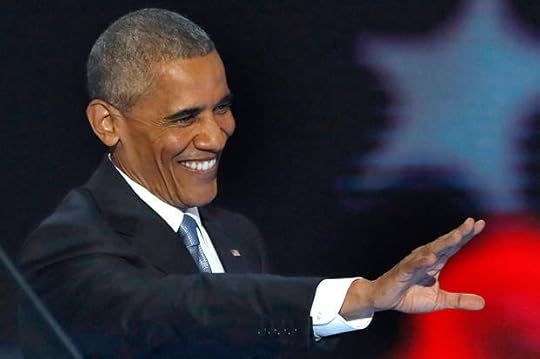
Barack Obama takes the stage at the Democratic National Convention in Philadelphia, July 27, 2016. (Credit: Reuters/Mike Segar)
PHILADELPHIA — Barack Obama’s stirring address to the Democratic National Convention on Wednesday night, a long-winded peroration of Bill Clinton-esque proportions, full of rhetorical peaks and valleys, had the feeling of a farewell address. Indeed, while Obama will occupy the Oval Office for another six months, it might have been his last big chance to address the nation as president. It fell into roughly three parts, like Caesar’s Gaul: An eloquent defense of his own legacy and accomplishments; an attack on the deranged and dangerous candidate put forward by the opposition party (which, as Obama observed, no longer resembles itself); and a passing of the political torch to his former rival, former strategic partner and anointed successor.
There were great strengths to that speech and also great weaknesses, which highlight the challenge awaiting Hillary Clinton as she accepts the Democratic nomination on Thursday. Whatever you make of Obama as a president, he remains one of the great political orators of our time, not least because of his remarkable ability to code-switch, to move from the vernacular of a South Side black preacher to the vernacular of his white Kansas grandparents with seamless comfort. Obama entered politics almost visibly seeking to claim the mantles of Martin Luther King Jr. and Bobby Kennedy, both of whom died when he and I were small children. How much Obama has done so in political terms is a far bigger issue than I can hope to address here. But as a public speaker, he is very much a rhetorical fusion of MLK and RFK.
But Obama’s code-switching was about more than his biracial heritage. His long speech wove its way through and around the central issue of this convention: the unpredictable infusion of new activist energy brought by the Bernie Sanders campaign, and the question of whether that is an asset or a liability when it comes to defeating Donald Trump. I remain amazed, and quite frankly insulted, that so many Democrats seem determined to crush internal dissent and insist on a happy-talk spectacle of enforced conformity. What party do they think they belong to, and what do they know about its history? It’s an insult to the collective intelligence of the broader left-liberal tradition in this country, delivered by well-meaning people who claim to be its defenders and ought to know better.
Obama absolutely didn’t do that, and whatever reservations you or I or anyone else may have about Hillary Clinton, I feel confident that she won’t do that either. Obama and Clinton are pragmatic institutional politicians, but both have a deep understanding of political history and the dynamics of political change. It’s important for all of us, especially critics on the radical left, to recognize that they also have personal experience from an outsider, activist perspective.
As Bill Clinton told us the other night, Hillary Rodham was an intelligent and highly ambitious young woman at a time when that marked her as rebellious, even as radical. She was a College Republican driven to switch sides by the Vietnam War who rang doorbells for Eugene McCarthy, the Bernie Sanders of his day. Barry Obama was a young African-American from a highly unusual background, who did not fit well in either white or black society. (He and I were briefly classmates at Columbia; I didn’t know him well but remember him as aloof, cool, likable and a bit of a loner.) Working as an activist and organizer in Chicago’s black community became both Obama’s pathway to power and the basis of his constructed identity. As numerous right-wing websites will inform you at length, both Clinton and Obama were influenced by Saul Alinsky’s “Rules for Radicals,” a theoretical and practical manual translating grassroots activism into political power.
Obama’s speech last night featured a calculated shout-out to Sanders and his supporters, and the president even threw in an impromptu “That’s right — feel the Bern!” Which he really doesn’t, and anyway it’s a hell of a lot easier to say that now. Hillary Clinton’s speech on Thursday will include a similarly gracious gesture, no doubt, which is just normal intra-party politics. More noteworthy and significant, at least to me, was Obama’s attempt to cast mainstream electoral politics as “real” politics, and to elide the complicated relationship between radical outsiders who demand the impossible and institutional insiders who deliver tiny increments of the real.
Just moments after invoking the Bern, Obama augmented his endorsement of Clinton by saying: “She has been caricatured by the right, and by some on the left.” He then drew on a well-known passage from a 1910 speech by Teddy Roosevelt called “Citizenship in a Republic,” which could not have been more clearly targeted at “Bernie or Bust” protesters and other left-wing critics of the Democratic Party mainstream. I had never considered the relationship between Obama and the elder Roosevelt before, but it merits further exploration: Teddy was a progressive Republican reformer, and also a committed nationalist and interventionist; he may have been the first president to perceive that women and African-Americans required and deserved full citizenship rights, although that goal remained well out of reach in his time.
It’s worth quoting Roosevelt’s speech at greater length than Obama did: “It is not the critic who counts; not the man who points out how the strong man stumbles, or where the doer of deeds could have done them better. The credit belongs to the man who is actually in the arena, whose face is marred by dust and sweat and blood; who strives valiantly; who errs, who comes short again and again, because there is no effort without error and shortcoming; but who does actually strive to do the deeds; who knows great enthusiasms, the great devotions; who spends himself in a worthy cause; who at the best knows in the end the triumph of high achievement, and who at the worst, if he fails, at least fails while daring greatly, so that his place shall never be with those cold and timid souls who neither know victory nor defeat.”
Obama’s point, of course, was that Hillary Clinton has spent her life getting covered in sweat and blood in the arena — as the most prominent female “man in the arena” in our history — while those of us who “criticize from the sidelines” (Obama’s words) are the cold and timid souls who have risked nothing. It’s an argument worth considering, especially for those of us who make a living sitting at a computer keyboard. But you can’t boil down the powerful ambiguity of Roosevelt’s words into a defense of partisan loyalty or institutional politics. As Obama and Clinton surely know, Teddy Roosevelt felt the Bern before Bernie Sanders was born. Two years after that speech, he rejected the bipartisan system and tried to strike out on his own: “Present conditions in the two old parties, and the platforms put forth by both of them … show that it is hopeless to get anything good out of them. To endeavor to punish each alternately by voting for the other is to follow the course most gratefully appreciated by the corrupt bosses of both.”
What deeds count as deeds, in Roosevelt’s sense, and what is the true arena of politics? Not even the most hardened Hillary hater can question her commitment to women’s rights, children’s welfare and education, and she has spent her life in the arena advocating for those causes. Amid the noise and smoke of the arena, she has also advocated for Wall Street investment banks, NSA surveillance programs and the drone war, and a series of disastrous foreign interventions for which Benghazi is the dumbed-down Republican synecdoche. She says she no longer supports wide-ranging free-trade deals on the NAFTA model, or slashing social services in the name of fiscal austerity, or bringing juvenile offenders “to heel.” Yes, there is no effort without error and shortcoming, but to many of Clinton’s critics that looks like effort expended on unworthy causes.
Yes, Hillary Clinton is a woman in the arena. She has made history, and will make more. But Bernie Sanders and his millions of supporters, who found out the hard way that idealistic political crusades don’t always have Hollywood endings, have been bloodied in the arena too. One of Obama’s best moments, and biggest cheers, came when he told the lit-up Philadelphia crowd that the task ahead involved not just electing Democrats up and down the ticket — “mayors and sheriffs and state’s attorneys and state legislators” — but also “hold[ing] them accountable until they get the job done.” That unglamorous work happens in the arena as well.
I’m sure Obama did not appreciate being heckled by a handful of protesters opposed to the drone war and the Trans-Pacific Partnership. Clinton, who can be prickly at times, will probably face more of the same on Thursday night. But I don’t think either of them is dumb enough to believe that public disagreement within the liberal-left coalition will somehow hand the election to Trump. Furthermore, they both understand that in the longer arc of political history, radicals who make seemingly unreasonable demands are necessary to move their party and the American public forward.
During his brief summary of his accomplishments, Obama included a boilerplate remark about how we had “learned that love has no limits, and marriage equality is now a reality across the land.” At first I felt irritated by this brazen hypocrisy: Obama and Clinton and most of the Democratic center opposed marriage equality until long after the point when public opinion had clearly shifted, viewing it as a dangerous wedge issue the Republicans could use in swing states and marginal districts. But if you read the transcript of Obama’s speech, he finesses the issue, seeming to take credit without actually doing so: It was “countless acts of quiet courage” that created this change.
That’s neatly put, but I would take issue with “quiet,” and so would the thousands of LGBT activists and supporters who battled for years, at every level of government and in every inch of the public arena, to make marriage equality real. Still, I choose to read that phrase as Obama’s quiet acknowledgment that on issue after issue, and in decade after decade, activists and radicals lead and the Democratic Party follows. Where was the party on civil rights in 1964, or Vietnam in 1968? Should the outsiders and dissidents in those years have shut up, put on ties and collected signatures at a shopping center? What did the party platform look like on criminal justice and trade issues and Wall Street regulation during Bill Clinton’s tenure, and how did we get from there to here? Where is the party on marijuana legalization right now, an issue on which many cities and many states (and some Republicans) are way ahead?
There’s no point denying that this convention has witnessed considerable tension between Sanders-juiced activist newcomers and Clintonite party regulars. It has also been packed every night, with an energy level many times greater than that found in the Trump Memorial Mausoleum last week in Cleveland. But the inside-outside interaction in Philadelphia has been more diverse and less confrontational, I would argue, than the image presented by many of my media colleagues. At its best, the Democratic Party has not thrived because of some enforced artificial unanimity, but because the tension between activists and institutions has fueled progressive change. At their best, leaders like Barack Obama — and, I hope, Hillary Clinton — understand that creative tension, and know how to channel it.
July 27, 2016
“America is already great”: President Obama’s moving DNC speech lifts Hillary, crushes Trump
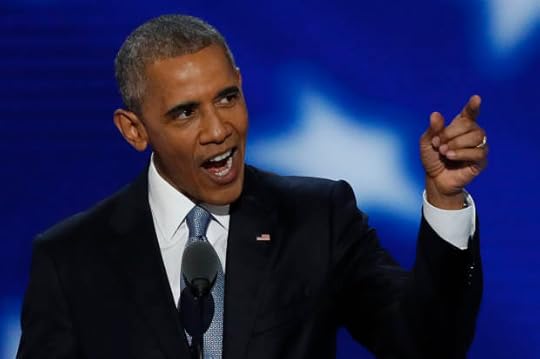
President Obama (Credit: Reuters)
His own legacy on the line, President Barack Obama implored Americans to elect Hillary Clinton to the White House, casting her as a candidate who believes in the optimism that powers the nation’s democracy and warning against the “deeply pessimistic vision” of Republican Donald Trump.
“America is already great. America is already strong,” he declared to cheering delegates Wednesday night at the Democratic convention. “And I promise you, our strength, our greatness, does not depend on Donald Trump.”
For Democrats, the night was steeped in symbolism, the passing of the baton from a barrier-breaking president to a candidate trying to make history herself. It culminated with Clinton making a surprise appearance on stage to greet Obama with a long embrace, an almost unimaginable image eight years ago when they battled for the Democratic nomination.
Obama urged Americans to summon the hopefulness of that White House campaign, before recession deepened and new terror threats shook voters’ sense of security. He robustly vouched for Clinton’s readiness to finish the job he started, saying “no matter how daunting the odds, no matter how much people try to knock her down, she never, ever quits.”
Earlier Wednesday, Clinton’s running mate, Virginia Sen. Tim Kaine, introduced himself to the nation as a formidable foil to Trump in his own right. With folksy charm, he ridiculed Trump’s list of promises and imitated one of the GOP candidate’s favorite phrases.
“Believe me!” he said mockingly, as the audience boomed back, “No!”
Obama’s vigorous support for Clinton is driven in part by deep concern that Republican Trump might win in November and unravel his two terms in office. He warned repeatedly Wednesday that the billionaire businessman is unprepared for the challenges that would await him in the Oval Office.
Trump fueled more controversy Wednesday when he encouraged Russia to meddle in the presidential campaign. On the heels of reports that Russia may have hacked Democratic Party emails, Trump said, “Russia, if you’re listening,” it would be desirable to see Moscow find and publish the thousands of emails Clinton says she deleted during her years as secretary of state.
Wednesday night’s Democratic lineup was aimed at emphasizing Clinton’s own national security credentials. It was a significant shift in tone after two nights spent reintroducing Clinton to voters as a champion for children and families, and relishing in her historic nomination as the first woman to lead a major political party into the general election.
The convention’s third night was also a time for Democrats to celebrate Obama’s legacy. Vice President Joe Biden, who decided against running for president this year after the death of his son, called it a “bittersweet moment.”
A son of Scranton, Pennsylvania, Biden appealed directly to the working class white voters who have been drawn to Trump’s populism, warning them against falling for false promises and exploitation of Americans’ anxieties.
“This guy doesn’t have a clue about the middle class,” he declared.
Kaine also picked up the traditional attacking role of the presidential ticket’s No. 2. He tore into Trump, mocking his pledges to build a wall along the Mexican border, asking why he has not released his tax returns and slamming his business record, including the now-defunct Trump University.
“Folks, you cannot believe one word that comes out of Donald Trump’s mouth,” Kaine said. “Our nation is too great to put it in the hands of a slick-talking, empty-promising, self-promoting, one-man wrecking crew.”
Liberals, particularly those who supported Vermont Sen. Bernie Sanders, have grumbled about Kaine being on the ticket, particularly because of his support for “fast track” approval of the Trans-Pacific Partnership trade pact. Several delegates held up anti-TPP signs as he spoke.
In a move aimed at broadening Clinton’s appeal, New York City Mayor Michael Bloomberg – an independent who considered launching a third party bid for president – endorsed the Democratic nominee. A billionaire businessman himself, Bloomberg took aim at Trump’s bankruptcies, reliance on foreign factories and other economic experience: “The richest thing about Donald Trump is his hypocrisy.”
President Bill Clinton, filling the role of devoted political spouse, joined the crowd packed to the arena rafters in cheering the attacks on Trump.
The core of Clinton’s strategy is putting back together Obama’s winning White House coalition. In both his campaigns, Obama carried more than 90 percent of black voters, the overwhelming majority of Hispanics, and more than half of young people and women.
That coalition was vividly on display in the first two nights of the convention in Philadelphia. Women lawmakers were prominently featured, along with young activists, immigrants, and mothers whose black children were victims of gun violence or killed during encounters with law enforcement.
Gun violence continued as a theme Wednesday night as families of mass shooting victims took the stage. Delegates rose in an emotional standing ovation for the mother of one of the victims in last month’s Orlando nightclub shooting, who asked why “commonsense” gun policies weren’t in place when her son died.
“I never want you to ask that question about your child,” Christine Leinonen said.
Though Obama has six months left in office, his address Wednesday had the feeling of a political transition. He was emotional as he thanked Americans for sustaining him through difficult stretches.
“Tonight, I ask you to do for Hillary Clinton what you did for me,” he said. “I ask you to carry her the same way you carried me.”
Tim Kaine breaks out his best Donald Trump impersonation to introduce himself to the DNC: “Believe me!”
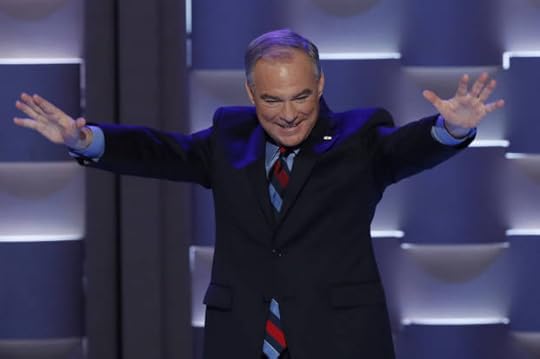
Democratic U.S. vice presidential nominee Tim Kaine walks onstage to accept the nomination on the third day of the Democratic National Convention in Philadelphia, Pennsylvania, U.S. July 27, 2016. REUTERS/Mike Segarr - RTSJZX3 (Credit: Reuters)
“Can I tell you something funny?” a folksy Time Kaine asked to introduce himself to the Democratic National Convention in Philadelphia after accepting the party’s nomination for vice president.
“We should all feel the Bern,” the Virginia Senator said, directly addressing rumors that Bernie Sanders delegates planned to stage a walk-out during his primetime address. “[A]nd we should all not want to get burned by the other guy,” he said to roars from the hall.
“Folks, you cannot believe one word Trump says,” the usually mild-manner Kaine said matter-of-factly.
“Not one word! Not one word!” the crowd energetically chanted back.
“Is there anyone in this building who believes him?”
“No!”
“Any party that would nominate Donald Trump for President has moved too far away from the party of Lincoln,” Kaine said, after highlighting his Republican father-in-law’s record desegregating Virginia schools.
Kaine then lowered his voice and got louder to deliver his best Trump impression.
“Trump is a guy who promises a lot, but you might have noticed he’s got a way of saying the same two words every time he makes his biggest, hugest promises,” Kaine mocked. “‘Believe me.’ It’s going to be great, ‘believe me.’ We’re going to build a wall and make Mexico pay for it, ‘believe me.’ We’re going to destroy ISIS so fast, ‘believe me.’ There’s nothing suspicious in my tax returns, ‘believe me.’
Here is Tim Kaine doing a Donald Trump impression #DemsinPhilly https://t.co/GdbMN1MBFj
— BuzzFeed News (@BuzzFeedNews) July 28, 2016
“I trust Hillary Clinton with our son’s life…I don’t trust Donald Trump,” he told the crowd, making the case for the party’s top of the ticket.
“Hillary is ready. She’s ready to fight. She’s ready to win, and she’s ready to lead.”
Joe goes on the attack: Biden electrifies DNC with fierce takedown of Trump
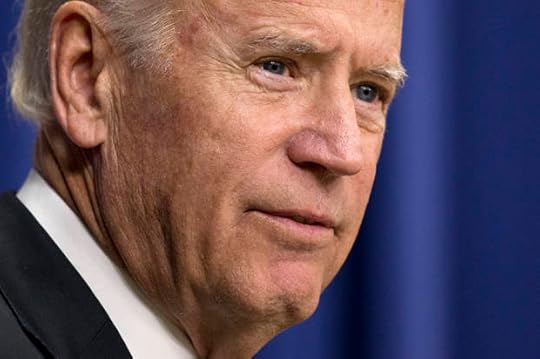
(Credit: AP/Manuel Balce Ceneta)
In perhaps the most stirring speech of the Democratic National Convention thus far, Vice President Joe Biden, animated and emphatic, tore into Donald Trump, calling the GOP nominee.
“The times are too uncertain to elect Donald Trump as President of the United States,” Biden said. “No major party nominee in the history of this nation has ever known less or has been less prepared to deal with our national security.
He compared his and Hillary Clinton’s middle-class origins to Trump’s, and reminded the audience that Trump became famous for the phrase “You’re fired!” Biden implored the audience to “think about that,” i.e. the fact that he enjoyed saying that phrase so much.
“We cannot elect a man who exploits our fears of ISIS and other terrorists, but has no plan to make us safer — a man who embraces the tactics of our enemies, torture and religious intolerance,” he added.
He further claimed that even Republicans know this, “and we simply cannot let [him be elected], period.”
“We lead not only by the example of our power,” he said, “but by the power of our example!”
He began by noting that eight years earlier, he accepted the nomination to be vice president. “Every single day since then,” he said, “we’ve been grateful to Barack and Michelle for asking to join them in that journey.”
Biden noted that the president is “a man of character, and he has become a brother to Jill and me — and Michelle, I don’t know where you are, kid, but you’re incredible. As they say in Delaware, Barack and I ‘married way up.'”
He spoke to those who survive without the robust support system that he and his family are fortunate enough to have, before praising teachers, who teach “not because that’s what they do, it’s who they are.”
When Biden finally turned to Hillary Clinton, he noted that once a week, she had breakfast with Biden and his family. “I know what Hillary is passionate about,” he said. “She understands that the college loan is about more than getting a qualified student an education — it’s about saving a mom and a dad the indignity of having to look at their talented child and say, ‘Sorry, the bank wouldn’t lend me the money you need to get to school.'”
Clinton, he argued, has “known for years that people go to bed staring at the ceiling and thinking, ‘What will we do if I get breast cancer or you get a heart attack?'” He declared that everyone in the room “knows what it will be like for their daughters and granddaughters when Hillary Clinton walks into the Oval Office — it will change their lives.”
“I’m a New Yorker and I know a con when I see one”: Mike Bloomberg goes to the DNC to knockout Trump
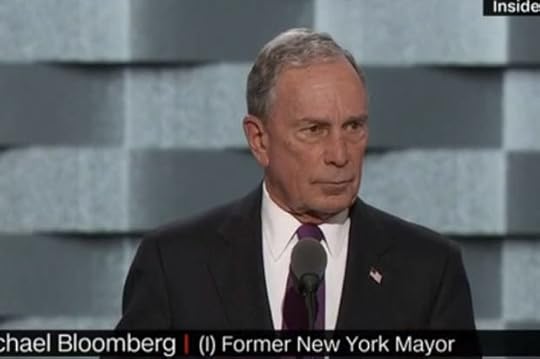
(Credit: CNN)
After booing former Democratic Defense Secretary Leon Panetta on the third night of the Democratic National Convention, Democratic delegates gave a rousing standing ovation to the Independent former New York City mayor Mike Bloomberg.
“I am here for one reason,” the conservative to moderate announced to the convention hall of Democratic activists and elected officials, “to explain why I believe it is imperative that we elect Hillary Clinton as the next President of the United States.”
Because up is down and we may be a few short months away from electing a former reality TV star as our commander-in-chief, Bloomberg’s blistering attack on fellow New York businessman Donald Trump’s record was received with wild applause — despite explicitly directing his address to Independent, not Democratic, voters.
“We must put disagreements aside for the good of the country & unite around the candidate who can defeat a dangerous demagogue,” Bloomberg said, after receiving scattered boos for outlining his policy disagreements with Democrats.
Then Bloomberg got to the meat of his blistering attack.
“I built a business and I didn’t do it with a million dollar check from my father,” Bloomberg said.
Michael Bloomberg: “Trump says he wants to run the nation like he runs his business? God help us.” #DemsInPhilly https://t.co/fBDMzxctMS
— CNN (@CNN) July 28, 2016
“Trump says he wants to run the nation like he’s running his business,” he continued. “God help us. I’m a New Yorker I know a con when I see one.”
Bloomberg on Trump: “I’m a New Yorker, and I know a con when I see one” #DemsInPhilly https://t.co/QR3pdmq9Lm https://t.co/ynTVgyxkxj
— CNN (@CNN) July 28, 2016
“Truth be told, the richest thing about Donald Trump is his hypocrisy.”
“So I say to my fellow independents –your vote matters now,” the surprise guest of the evening said, reaching out to non-Democrats.
“Let’s elect a sane, competent person.”
Mike Bloomberg is doing a great job as Mayor of New York City. Ray Kelly is a great Police Commissioner. @MikeBloomberg
— Donald J. Trump (@realDonaldTrump) April 16, 2012
DNC crowd chants “No more war!” at former CIA Director Leon Panetta
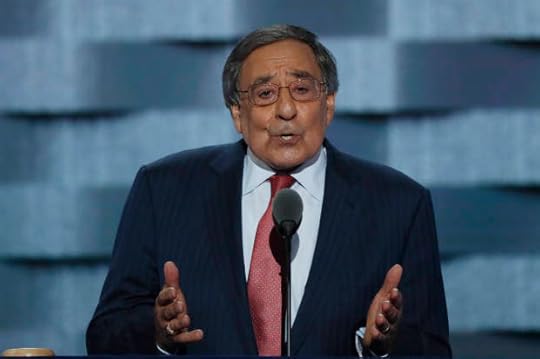
Former U.S. Congressman and Secretary of Defense Leon Panetta speaks on the third day of the Democratic National Convention in Philadelphia, Pennsylvania, U.S. July 27, 2016. REUTERS/Mike Segar - RTSJZPJ (Credit: Reuters)
Former CIA Director and Secretary of Defense Leon Panetta’s address to the Democratic National Convention in Philadelphia on Wednesday was met with loud boos and chants of “No more war!” and “Lies!” from the delegation.
Panetta, who headed the CIA and Department of Defense under President Obama, called Hillary Clinton “the single most experienced and prepared person who has ever run for President of the United States,” but was interrupted by the unruly crowd repeatedly during his speech.
Crowd chants "USA," "no more wars," "lies" interrupt Panetta's DNC speech https://t.co/H9n7JJUntx #DemsInPhilly https://t.co/0Uv5GIWs93
— CBS News (@CBSNews) July 28, 2016
Chants of “No more war!” from anti-Panetta delegates were countered with chants of “USA!” from attendees sympathetic to the former CIA director and defense secretary, who has drawn criticism for his handling of drone strikes and classified information, among other controversies.
Panetta’s speech responded critically to comments Donald Trump made at a press conference Wednesday morning calling on Russia to release emails potentially hacked from Hillary Clinton’s private server. “Think about that for a moment,” Panetta said. “Donald Trump, who wants to be President of the United States, is asking one of our adversaries to engage in hacking or intelligence efforts against the United States to affect an election.”
Gabby Giffords delivers moving endorsement of Hillary Clinton: “Speaking is difficult for me, but in 2017, I will be able to say ‘Madame President'”
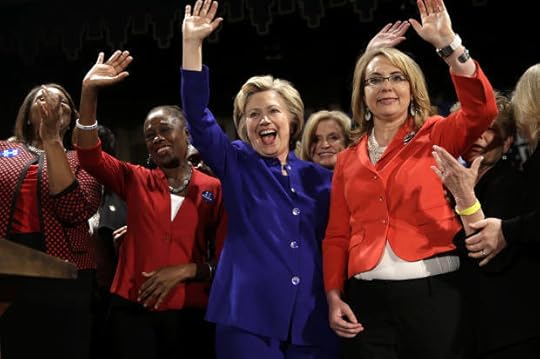
Democratic presidential candidate Hillary Clinton, second from right, waves to the crowd with former Arizona Rep. Gabby Giffords, right, and the first lady of New York City Chirlane McCray during a Women for Hillary event in New York, Monday, April 18, 2016. (AP Photo/Seth Wenig) (Credit: AP)
Former Arizona Representative Gabriel Giffords — who was shot by Jared Laughner at a rally in 2011 — gave a moving speech at the Democratic National Convention Wednesday night in which she endorsed Hillary Clinton as a candidate who would support common sense gun legislation over “what’s politically expedient.”
“When I was in Congress,” she said, “I learned that strong women get things done. Hillary is tough. Hillary is courageous. She will fight to make our family safer. In the White House, she will stand against the gun lobby. That’s why I’m voting for Hillary.”
“Speaking is difficult for me,” Giffords added, “but in January 2017, I will be able to say these words — ‘Madame President.'”
In her January column endorsing Clinton, Giffords wrote that “today, during our second chance at service, [former astronaut] Mark [Kelly] and I continue to fight for what we’ve always fought for — independence, freedom, and common sense.”
“That’s why we’re fighting for a Congress and White House that stand up to the corporate gun lobby’s intimidation and bullying. And that’s why, today, we are endorsing Hillary Clinton for president.”
Watch Giffords’ entire speech below via ABC.
Vote with your fork: A national food policy could be really sweet for the economy

On Wednesday’s Salon live at the Democratic National Convention, host Josh Zepps talked to food policy advocate Evan Hanczor about the importance of a national food policy that reduces sugar consumption.
“The economy, security, human civil rights, economic and general social inequality all connect to food in some way,” Hanczor explained. “And food could also be a huge driver for change in all those areas.”
Zepps noted that the Food and Drug Administration, which regulates food policy, answers to the USDA, which is in charge of “subsidizing the increased production of sugar,” according to Hanczor.
“They have this schizophrenic existence that I don’t think is helping anyone,” Hanczor said.
Watch above:
“Food has a body image issue in America”: A staggering amount food is wasted — and for the dumbest reasons

“We waste 40 percent of the food produced in this country,” said chef Evan Hanczor. “Which, when you stop and think about that, is absolutely insane.”
Hanczor, a food policy advocate and chef-partner at the Brooklyn restaurant Egg, sat down with moderator Josh Zepps at the Democratic National Convention on Wednesday and discussed the implications of food waste in a Facebook Live chat hosted by Salon.
“Food is wasted along every part of the supply chain,” Hanczor explained. “Some of it starts in the field — say crop prices are low and farmers decide to just leave the crops there because it’s not worth it to pick them.”
“But even the crops that are harvested, some gets lost in transportation,” he continued. “Some gets sent back by retailers because it’s ugly and doesn’t meet the cosmetic standards. Food has a body image issue in America. People don’t want to buy bruised or misshapen fruits or vegetables.”
Zepps turned the conversation to solutions that might help us mitigate the negative consequences of our current food production system, which include antibiotic resistant bugs.
“The biggest thing we could do is reduce how much meat we’re eating,” Hanczor said. “Because that will reduce demand, that will allow us to change our means of production. I think meat has a role to play, but we certainly eat too much of it in America.”
Watch the full video above.
The Evolution of Michelle Obama, Convention Speaker
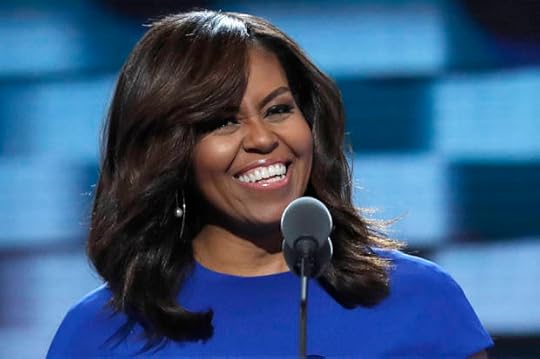
Michelle Obama speaks at the Democratic National Convention in Philadelphia, July 25, 2016. (Credit: Reuters/Mark Kauzlarich)
If a speech can be measured by Trump’s standard —how much attention it receives — Michelle Obama’s address at the Democratic National Convention was not just a home run but a grand slam. The speech has already received a great deal of coverage, most of it highly positive, and some highly confused. Fox News pundit Bill O’Reilly, for example, made some (to borrow from the pundit’s phraseology) boneheaded comments on his show Tuesday night. Affecting the air, though not the scholarship, of a professor of history, O’Reilly conceded the accuracy of Obama’s remark “I wake up every morning in a house that was built by slaves.”
Then O’Reilly somehow felt the need to try to mitigate the line’s emotional effect by noting that the slaves “were well-fed and had decent lodging,” a claim, ironically, of questionable historical accuracy.
The passage in Obama’s speech is itself destined for the history books. “That is the story of this country, the story that has brought me to this stage tonight, the story of generations of people who felt the lash of bondage, the shame of servitude, the sting of segregation, but who kept on striving and hoping and doing what needed to be done so that today, I wake up every morning in a house that was built by slaves, and I watch my daughters — two beautiful, intelligent, black young women — playing with their dogs on the White House lawn,” Obama had declared the night before.
The remarks were noteworthy for reasons other than its provocation of idiotic and inhumane coverage from the right-wing media. In highlighting the ever-evolving nature of America itself, Obama’s speech was the third phase in a personal evolution, at least as expressed via her convention addresses at the last three DNCs.
While Melania Trump’s brazen plagiarism of Michelle Obama’s 2008 speech came as quite a shock, the fact that she chose to crib from Obama’s first DNC address, and not her second, was far less surprising. Amongst the stolen lines were the soon-to-be first couples hopes for their daughters. “We want our children — and all children in this nation — to know that the only limit to the height of your achievements is the reach of your dreams and your willingness to work for them,” she said. The message was deeply conservative, suggesting that individual agency was the solely responsible for determining one’s lot in life. The lines were, of course, contextualized in a discussion about racial discrimination and progress, and the devastating effects of poverty. But Obama’s vivid description of her and her husband’s working class backgrounds didn’t emphasize the external limitations imposed on their parents’ success. It emphasized the extent to which they had each taken control of, and shaped, their own destinies. To do so was a personal quality; it was what attracted Michelle to Barack.
This narrative underwent a subtle transformation in 2012. Perhaps because, after four years in the White House, Obama was more legitimately able to stake her claim as a political figure in her own right, and perhaps in response to the growing influence of the Tea Party’s economic extremism, her message was new. In highlighting her father’s background, Obama stressed that his dreams were for his children, not himself, an implicit recognition that structural impediments often prevent americans from achieving their full potential. “[Our families] believed in that fundamental American promise that, even if you don’t start out with much, if you work hard and do what you’re supposed to do, then you should be able to build a decent life for yourself and an even better life for your kids and grandkids,” she said. America’s promise was not that you could have a great life, but a decent one. It was not that you could attain whatever you aspired to, but that your children would aspire to more. And it merged the work of parenting with that promise of America: to do better by our children. Again, the speech contained the implicit recognition that we aren’t doing well enough.
Obama’s convention remarks this week week went slightly further. In discussing parenthood and its relation to the American dream, Obama stressed the inherently political nature of being a black mother to the black children of the first black President. And, in doing so, she drew attention to the racism she and her family have had to cope with, and the influence of that hate on her family life. “[A]s we try to guide and protect our girls through the challenges of this unusual life in the spotlight…we urge them to ignore those who question their father’s citizenship or faith,” Obama said. The line also effectively took racist rhetoric out of the realm of ordinary political disagreements, and accurately described it as something deeply personal. Far less prominent parents all over America are, at this moment, having similar conversations with their fearful children about the best way to respond to a culture of hate, one being stoked by the DNC’s political opponents.
In talking about the changing nature of opportunity, Obama also took a more actively nuanced approach than we’ve seen from her before. She countered the propagandistic notion of extreme individualism as paramount, a notion she had, eight years ago, furthered. Instead, she acknowledged, much to the chagrin of conservative commentators, that many of the hardest workers in American history were, by deeply discriminatory and unjust laws, barred from partaking in its dream. She did not do so to disparage or criticize America, though she would have been entirely entitled. Instead, she described the ever-growing nature of American opportunity as a testament to American progress, not just on a familial level — the dreams people have for their children — but on a societal one: the dreams people have for the nation in which their children will live.
But the truly masterful stroke came in coopting the right’s rhetoric on “work.” Propaganda about limitless opportunity for all Americans is not just damaging for its suggestion that government aid and services are unnecessary in a nation where hard work and vision are all that stand between poverty and great wealth. It is also damaging for its suggestion that social justice is a silly distraction. It’s easy to shrug off taunts when they don’t have an impact on one’s material conditions. It’s far harder to do so when they are merely symptoms of widespread systemic problems that prevent equal access to the promise of America, when one’s identity in these realms poses a threat to your physical safety and autonomy, to your education and work and housing prospects, to the reach of your dreams.
The right’s suggestion, too often, is that people of color should stop whining about white privilege, and instead focus on bettering there own lives via the redemptive power of hard work. In other words, the issues of the so-called culture wars should be secondary to supposedly more pressing economic concerns, which helps justify supporting an overtly racist candidate because he’s more likely to help pass your budget. Obama had equal faith in work’s redemptive power, but expanded its scope to include those who are fighting those culture wars, who have dedicated their lives to breaking down barriers for entire categories of people, rather than simply surmounting those barriers themselves. Because, in her words, “we are always stronger together.”



